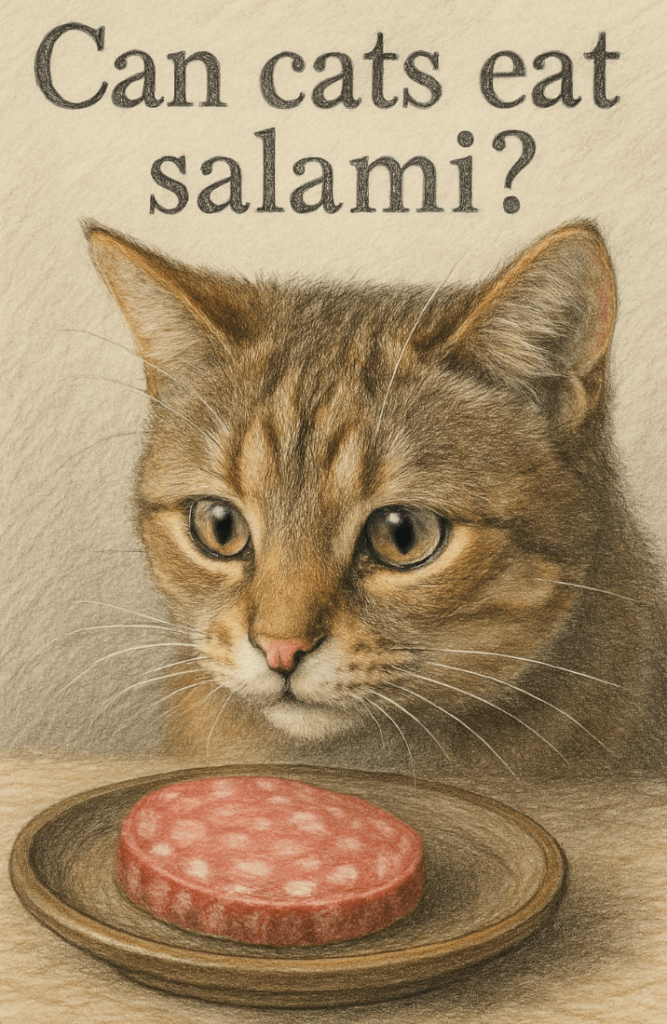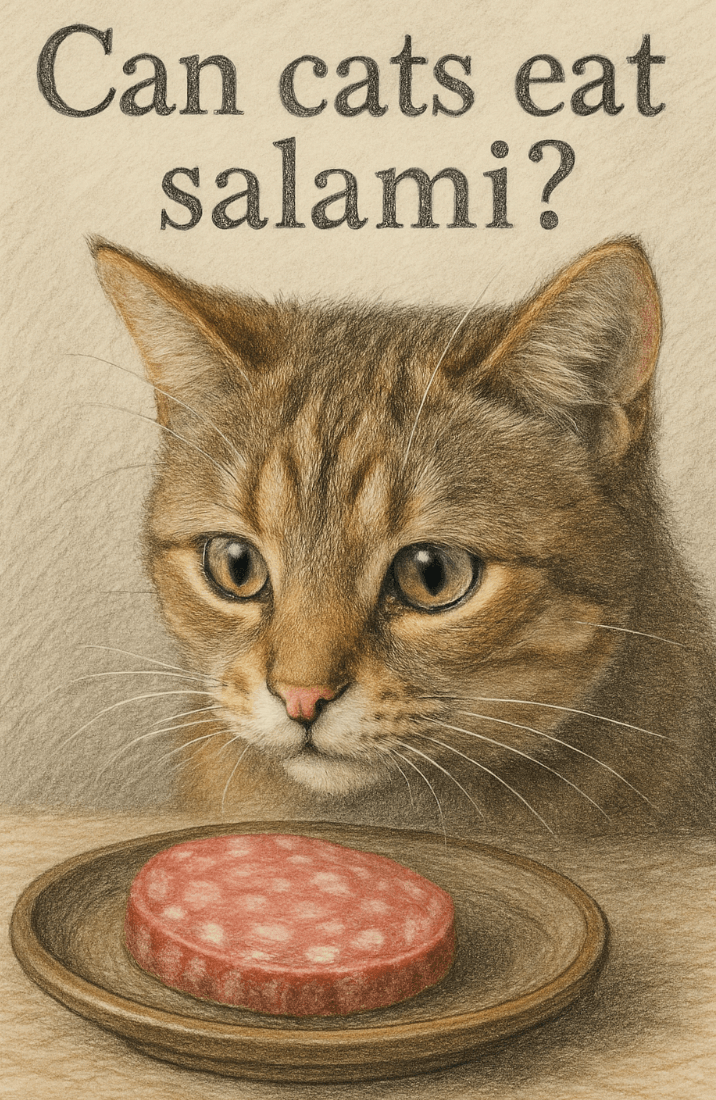Can Cats Eat Salami?
When it comes to sharing human food with our feline friends, many pet owners wonder whether certain foods are safe for cats. Salami, a popular cured meat known for its rich flavor, might seem like an appealing treat to share with your cat. However, before tossing a slice their way, it’s important to understand the potential risks and benefits. While cats are obligate carnivores and can digest some meats, not all human foods are suitable for them. In this blog post, we’ll explore whether salami is safe for cats, what to watch out for, and how to make informed decisions about their diet.
Potential Risks of Feeding Salami to Cats
While salami may be a tasty snack for humans, it poses several risks to cats due to its ingredients and preparation methods. Understanding these dangers is crucial to keeping your cat healthy and happy.
High Salt Content:
Salami contains excessive amounts of salt, which can lead to dehydration, kidney issues, or sodium ion poisoning in cats.Spices and Seasonings:
Many salamis are flavored with garlic, onion powder, or other spices that are toxic to cats and can damage their red blood cells.Fat Content:
The high fat content in salami can upset your cat’s stomach, leading to vomiting, diarrhea, or pancreatitis over time.Preservatives and Additives:
Nitrates and nitrites used in curing salami can be harmful to cats and may increase the risk of health complications.Choking Hazard:
Large pieces of salami can pose a choking risk, especially for smaller cats or those prone to gulping food.
These risks highlight why salami should be approached with caution when considering it as a treat for your cat.
Benefits of Feeding Small Amounts of Plain Meat (Not Salami)
If you’re looking to give your cat a meat-based treat, there are safer alternatives to salami that provide nutritional value without the associated risks.
High-Quality Protein:
Plain, cooked meats like chicken or turkey offer essential amino acids that support muscle development and overall health.Low Sodium Options:
Unseasoned, boiled meats ensure your cat gets protein without the harmful effects of excessive salt.Hydration Support:
Wet or shredded plain meats can encourage water intake, helping maintain proper hydration levels.Natural Instinct Satisfaction:
Offering small portions of safe meats satisfies your cat’s instinctual craving for animal-based proteins.Improved Palatability:
Cats often enjoy the taste of plain meats, making them a great reward during training or bonding sessions.
By choosing healthier options, you can provide your cat with the benefits of meat without compromising their well-being.
Check this guide 👉Can Cats Eat Oranges? Best 7 Expert Tips!
Check this guide 👉Can Cats Eat Turtles? Best 7 Expert Tips!
Check this guide 👉Can Cats Eat Saffron? Best 7 Expert Tips!

Safe Meat Options for Cats | Risks of Feeding Processed Meats |
|---|---|
Boiled, unseasoned chicken | High sodium content |
Plain, cooked turkey | Harmful spices and seasonings |
Lean beef (in moderation) | Excessive fat leading to pancreatitis |
Shredded fish (boneless and cooked) | Preservatives like nitrates |
Small portions of lamb | Choking hazards from large chunks |
Signs Your Cat May Be Suffering from Food-Related Issues
If your cat accidentally consumes salami or another unsafe food, it’s important to recognize the signs of distress early. Here’s what to look out for.
Vomiting or Diarrhea:
These symptoms often indicate gastrointestinal upset caused by fatty or salty foods.Excessive Thirst or Urination:
Increased water consumption can signal sodium poisoning or kidney stress from high-salt foods.Lethargy or Weakness:
A sudden lack of energy may suggest toxicity or dehydration related to unsafe food consumption.Difficulty Breathing:
Labored breathing could indicate a severe allergic reaction or choking hazard.Loss of Appetite:
Refusal to eat may point to digestive discomfort or illness triggered by inappropriate food.
Recognizing these signs allows you to act quickly and seek veterinary care if necessary.
Tips for Introducing New Foods Safely
If you decide to introduce new foods into your cat’s diet, it’s essential to do so cautiously and responsibly. Follow these tips to minimize risks.
Consult Your Veterinarian First:
Always check with your vet before offering any human food to ensure it’s safe and appropriate.Start with Small Portions:
Begin with tiny amounts to monitor your cat’s reaction and avoid overwhelming their system.Avoid Processed Foods:
Stick to natural, unprocessed options free from additives, spices, and preservatives.Monitor for Allergic Reactions:
Watch for itching, swelling, or digestive issues after introducing a new food.Stick to Cat-Specific Treats:
Commercial cat treats are formulated to meet feline dietary needs and are a safer option than human snacks.
By following these guidelines, you can safely experiment with new foods while prioritizing your cat’s health.
Common Mistakes to Avoid When Feeding Cats Human Food
Feeding cats human food can be risky if done improperly. Avoid these common mistakes to protect your cat’s health.
Assuming All Meats Are Safe:
Not all meats are created equal—processed or seasoned meats can harm your cat despite being animal-based.Ignoring Portion Sizes:
Even safe foods can upset your cat’s stomach if given in large quantities; moderation is key.Skipping Veterinary Advice:
Failing to consult your vet before introducing new foods can lead to unintended consequences.Using Leftovers as Treats:
Table scraps often contain harmful ingredients like onions, garlic, or excess fats that are dangerous for cats.Overlooking Symptoms of Illness:
Delaying action when your cat shows signs of distress can worsen their condition; act promptly instead.
Avoiding these pitfalls ensures your cat enjoys treats safely and responsibly.
Healthier Alternatives to Salami for Cats
If you want to treat your cat without resorting to salami, here are some healthier options that align with their dietary needs.
Cooked Chicken Strips:
Plain, boneless chicken provides lean protein and satisfies your cat’s carnivorous cravings.Steamed Fish Fillets:
Boneless, skinless fish like salmon or cod offers omega-3 fatty acids and essential nutrients.Cat Grass or Herbs:
Some cats enjoy nibbling on cat-safe grass or herbs like catnip for variety and enrichment.Homemade Cat Treats:
Simple recipes using ingredients like tuna, pumpkin, or eggs create nutritious snacks at home.Commercial Cat Treats:
Store-bought treats designed specifically for cats are a convenient and safe choice.
These alternatives allow you to spoil your cat without risking their health.
Understanding Your Cat’s Nutritional Needs
Cats have unique dietary requirements as obligate carnivores, meaning they rely heavily on animal-based proteins. Understanding their needs helps you make better feeding decisions.
High Protein Requirement:
Cats need diets rich in animal proteins to support muscle growth, energy levels, and overall vitality.Limited Carbohydrate Tolerance:
Unlike humans, cats process carbs poorly; grains and fillers should be minimized in their diet.Essential Amino Acids:
Taurine, found in meat, is critical for heart health, vision, and reproductive function in cats.Hydration Through Food:
Wet foods or moisture-rich snacks help prevent dehydration, which is common in cats prone to low water intake.Balanced Diet Importance:
A complete and balanced diet ensures your cat receives all necessary vitamins, minerals, and nutrients daily.
Meeting these needs ensures your cat thrives and avoids unnecessary health issues.
Frequently Asked Questions About Cats and Salami
Is salami toxic to cats?
While not immediately toxic, salami contains ingredients like salt and spices that can harm cats if consumed regularly or in large quantities.
What happens if my cat eats salami?
Mild cases may cause digestive upset, but larger amounts could lead to more serious issues like sodium poisoning or pancreatitis.
Can kittens eat salami?
Kittens are even more vulnerable to the harmful effects of salami, so it’s best to avoid giving it to them entirely.
Are there any safe cold cuts for cats?
Plain, low-sodium deli meats like turkey or chicken may be safe in very small amounts, but always consult your vet first.
What should I do if my cat ate salami?
Monitor them closely for signs of illness and contact your veterinarian if you notice any concerning symptoms.
Prioritizing Your Cat’s Health Over Curiosity
While it might be tempting to share a slice of salami with your curious feline friend, it’s clear that this processed meat poses significant risks to their health. Instead, focus on providing safer, cat-friendly alternatives that meet their nutritional needs without compromising their well-being. By understanding the potential dangers and opting for healthier choices, you can ensure your cat stays happy, healthy, and thriving. Remember, your cat relies on you to make the best dietary decisions—so always prioritize their safety above all else.
Do Cats Have Taste Buds? Best 7 Expert Tips! – Discover how cats experience flavors and why their taste is so unique.
Do Dogs Have Taste Buds? Best 7 Expert Tips! – Discover how dogs experience taste, their preferences, and what it means for their diet and health.
Can Cats Taste Sweet? Best 7 Expert Tips! – Discover why cats can’t taste sweetness, how it affects their diet, and tips to keep them healthy and happy.
Can Dogs Taste Sweet? Best 7 Expert Tips! – Discover how dogs perceive sweetness, which foods are safe, and tips to manage their sweet cravings responsibly.





